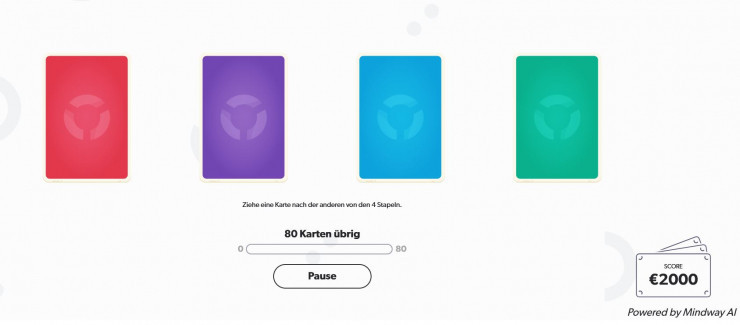AI self-test launched to detect in-game issues

The German Sports Betting Association and Mindway AI recently released an AI-assisted self-test in the form of a card game called "Gamalyze". Gamers can use this tool to analyse their gambling behaviour. In addition to a precise list of gambling problem susceptibilities and corresponding warnings, the test also provides specific tips on how to reduce the risk.
The German Sports Betting Association (DSWV) repeatedly emphasises the importance of effective measures to reduce the risk of gambling addiction and to detect it at an early stage. The DSWV reiterated this stance at the recent "Action Day on Gambling Addiction 2023" organised by the Federal Centre for Health Education (BZgA). On this occasion, the association made the "Gamalyze" self-test available on its website (and continues to do so).
The tool has been developed in collaboration with Danish software company Mindway AI. Players are given the opportunity to have their gaming behaviour analysed in detail. The special thing about it is that it is not a typical questionnaire, but a game of chance itself. With the help of artificial intelligence and neuroscience, the player's behaviour is examined and analysed. The results are available in the form of concrete and easy-to-understand data. Tips are also given on how to effectively avoid such difficulties.
How the self-test works
The DSWV has published a press release detailing the new self-test. The CEO of the partner company Mindway AI, Rasmus Kjaergaard, also has his say. He explains the basic function of the tool as follows:
"Gamalyze analyses gambling behaviour under real-life conditions, i.e. while the player randomly draws cards with which he either wins or loses money. Even if it is only play money, the personal risk of risky gambling behaviour can be determined much better than with classic questionnaires".
At the end of each round, you will receive a score, an assessment of your risky behaviour and advice on how to make your game less risky. Tips are tailored to each round and may include planning your budget in advance, regularly reviewing your game, treating yourself or taking a break to increase the excitement of the next bet.
Step by step: What exactly happens during the test?
Anyone arriving at the DSWV self-test page is immediately greeted by the tool. It does not need to be opened first, but is immediately available.
- Get started by clicking or (mobile) tapping on "Start game". You will be asked to accept the terms and conditions. No personal information is requested. The test is anonymous.
- Once you have started, you will be given brief instructions: follow the strategy you think will give you the best results. One by one, 80 cards are drawn from four decks. Each card represents either a win or a loss. The starting amount is 2,000 Euros.
- As soon as the game starts, the card stacks appear, along with a display of the remaining cards and the available balance. There is also a pause button. The cards can be played by simply clicking or tapping on the deck.
- During a round, you will be shown progress indicators and asked if you see any patterns. Once you confirm or answer, the game continues.
- When all the cards have been drawn, the round is over and Gamalyze wants to know how you rate your own risk. The rating is based on a bar with a scale from low to high. A little man can be moved along this scale in the desired direction.<l/i>
- The rating then takes place. It is divided into the factors "sensitivity to winning", "sensitivity to losing", "sensitivity to the frequency of winning" and "persistence". The test gives a percentage score and a comment for each area.
- On the same page you will find recommendations on how to reduce your own risk. There are no blanket "stop gambling" tips, but rather approaches that motivate you to think about your own behaviour. For example: "Do you regret any or all of your gambling over the past few months? This could mean that your risk appetite is higher than you intended".
Conclusion
Image source: Screenshot von https://www.dswv.de/selbsttest/

0 Comments to: AI self-test launched to detect in-game issues
write a commentOur community thrives on your feedback - so let us know what you think!
Would you like to write comments on GambleJoe yourself? Then just create a GambleJoe User Account.